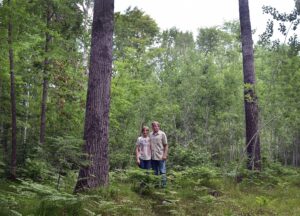Winter hasn’t quite let loose its grip on the Wilson State Nursery fields in Boscobel, but the warm weather has turned any snow into puddles and with limited frost in the ground, it won’t be long. These conditions in Wisconsin’s fields and forests make it easy for landowners to hike their property and consider ways to enhance them. And as thoughts turn to spring, the staff in the Wisconsin DNR’s reforestation program are readying themselves to harvest tree and shrub seedlings from the cool, moist soil.
For those considering activities to improve their properties, the DNR reforestation program has plenty of seedlings still available to create and enhance wildlife habitat, stabilize the soil, block winter wind and snow and provide a future shady spot to sit and enjoy a morning. Continue reading “Seedlings Still Available For Spring 2024 Planting”


